
 The role of bridge approach slabs in vehicle safety and infrastructure integrity is critical but often underestimated. When these slabs begin to sink, the consequences can be dire, ranging from vehicular damage to potential accidents. Such sinking typically originates from imbalances and instability in the underlying soil. It's not just an issue to be patched; it's about stabilizing the ground itself to ensure long-term durability and safety.
The role of bridge approach slabs in vehicle safety and infrastructure integrity is critical but often underestimated. When these slabs begin to sink, the consequences can be dire, ranging from vehicular damage to potential accidents. Such sinking typically originates from imbalances and instability in the underlying soil. It's not just an issue to be patched; it's about stabilizing the ground itself to ensure long-term durability and safety.
Understanding the "Bump" Problem
When bridge approach slabs become uneven or sink, they cause a height difference with the adjacent road or bridge deck. This manifests as bumps that are more than mere inconveniences; they are safety hazards. A minor elevation difference can create significant stress concentrations, leading to damaging impacts on vehicle suspensions and road infrastructure, particularly at high speeds.
Strategies to Alleviate Risks
Quick fixes like asphalt wedging may offer temporary relief but are not durable, leading to repeated maintenance cycles and increased costs. Polyurethane foam has emerged as a lasting solution, offering excellent compressive strength for soil stabilization beneath the slabs. Once cured, this foam provides strong and stable support, drastically reducing future sinking risks.
Quick Cure, Less Disruption
One advantage of polyurethane foam is its quick curing time. Traditional methods may necessitate extended lane closures, but polyurethane foam sets within minutes, allowing for quicker repairs. This minimizes traffic disruption, an often overlooked but significant concern for maintenance managers.
Polyurethane Foam's Versatility
Polyurethane foam is adaptable to various soil types and slab materials, coming in formulations customizable for specific project needs. Regardless of whether the soil is sandy, clayey, or loamy, the foam can be modified to provide optimal adhesion and compressive strength, mitigating the risks of slab sinking due to soil instability. Additionally, the foam has excellent water resistance. Hydrophobic formulations repel water, preserving the soil integrity underneath the slab—a vital feature in regions with high precipitation or prone to flooding.
Engineering Principles for Durability
The application of polyurethane foam is grounded in sound engineering. When injected, the foam expands, stabilizing the soil, leveling the concrete, and distributing the slab's load more evenly. This reduces point loads and stress concentrations, extending the slab's longevity and the overall durability of the bridge-to-road transition. The foam's adhesive qualities create a monolithic structure between the slab and soil, rendering it resistant to future shifts. This quality is invaluable in seismic-prone areas where ground movements can compromise infrastructure.
Cost-Efficiency
While polyurethane foam has slightly higher upfront costs compared to traditional methods like mudjacking, its durability makes it cost-effective in the long run. Reduced maintenance cycles and the speed of application minimize both direct and indirect costs, making polyurethane foam an economically sound choice.
Safety Protocols in Application
Safety is paramount during the foam's application. Engineers and crews must wear appropriate Personal Protective Equipment, including gloves and eye protection. Specialized equipment must be used for the foam injection, and staff should be well-trained to prevent over-injection, which could lead to additional stresses and imbalance.
Ensuring Vehicle Safety
Addressing the challenges of sinking or unstable bridge approach slabs significantly enhances vehicle safety. Polyurethane foam emerges as a multi-faceted solution that not only mitigates immediate risks but offers long-term durability. Its quick curing time, adaptability, and engineering advantages make it an essential tool for infrastructure teams committed to the highest safety standards.
Want more information on geotech polyurethane grout applications?



 As a municipal manager or administrator, you’re well aware of the challenges and solutions related to maintaining the structural integrity of infrastructure like bridge approach slabs. The numerous benefits of polyurethane foam, including its cost-effectiveness, quick application time, and long-term durability, make it a compelling choice for bridge approach slab leveling and stabilization.
As a municipal manager or administrator, you’re well aware of the challenges and solutions related to maintaining the structural integrity of infrastructure like bridge approach slabs. The numerous benefits of polyurethane foam, including its cost-effectiveness, quick application time, and long-term durability, make it a compelling choice for bridge approach slab leveling and stabilization.



 Budget constraints are a perennial concern for infrastructure maintenance operations. Whether it's the upkeep of roads, bridge approach slabs, or other critical components, there is an ever-present need to optimize spending without compromising quality. Administrators and engineers alike are continually searching for cost-effective, long-term solutions that deliver robust performance and minimize future maintenance costs.
Budget constraints are a perennial concern for infrastructure maintenance operations. Whether it's the upkeep of roads, bridge approach slabs, or other critical components, there is an ever-present need to optimize spending without compromising quality. Administrators and engineers alike are continually searching for cost-effective, long-term solutions that deliver robust performance and minimize future maintenance costs.
 One of the most pressing challenges in infrastructure maintenance is managing slab repairs on busy roadways, including bridge approach slabs, streets, and highways. These repairs often lead to unavoidable traffic disruptions, posing operational challenges that can significantly impact the daily commute and local economy. As a result, there's an increasing need for solutions that are not only effective in restoring structural integrity but also quick, thus minimizing the time lanes are closed.
One of the most pressing challenges in infrastructure maintenance is managing slab repairs on busy roadways, including bridge approach slabs, streets, and highways. These repairs often lead to unavoidable traffic disruptions, posing operational challenges that can significantly impact the daily commute and local economy. As a result, there's an increasing need for solutions that are not only effective in restoring structural integrity but also quick, thus minimizing the time lanes are closed.
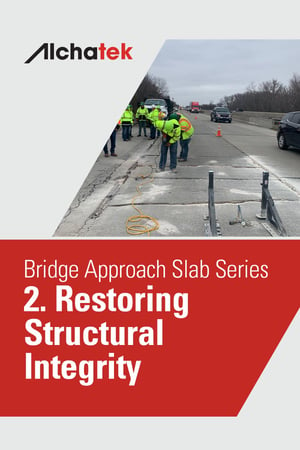 Structural integrity often takes center stage when discussing the engineering behind bridges, leaving the bridge approach slabs in the periphery. Yet, the approach slabs bear significant loads, channel them effectively into the bridge structure, and play a crucial role in maintaining the structural integrity of the entire bridge system. When these slabs sink or become uneven, the ripple effect goes beyond vehicle safety, impacting the structural equilibrium of adjoining infrastructure. Thus, maintaining their integrity becomes a multi-faceted endeavor.
Structural integrity often takes center stage when discussing the engineering behind bridges, leaving the bridge approach slabs in the periphery. Yet, the approach slabs bear significant loads, channel them effectively into the bridge structure, and play a crucial role in maintaining the structural integrity of the entire bridge system. When these slabs sink or become uneven, the ripple effect goes beyond vehicle safety, impacting the structural equilibrium of adjoining infrastructure. Thus, maintaining their integrity becomes a multi-faceted endeavor.
 The role of bridge approach slabs in vehicle safety and infrastructure integrity is critical but often underestimated. When these slabs begin to sink, the consequences can be dire, ranging from vehicular damage to potential accidents. Such sinking typically originates from imbalances and instability in the underlying soil. It's not just an issue to be patched; it's about stabilizing the ground itself to ensure long-term durability and safety.
The role of bridge approach slabs in vehicle safety and infrastructure integrity is critical but often underestimated. When these slabs begin to sink, the consequences can be dire, ranging from vehicular damage to potential accidents. Such sinking typically originates from imbalances and instability in the underlying soil. It's not just an issue to be patched; it's about stabilizing the ground itself to ensure long-term durability and safety.
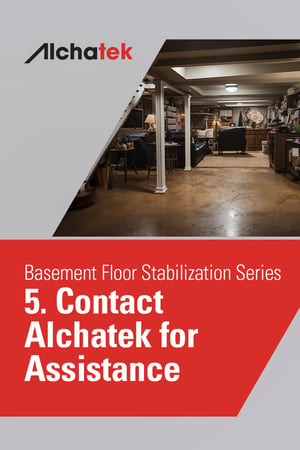 Your home is more than just a structure; it's a sanctuary, a place where memories are made and cherished. Ensuring its stability and safety is paramount. If you've noticed cracks, unevenness, or other signs of instability in your basement floor, it's time to take action.
Your home is more than just a structure; it's a sanctuary, a place where memories are made and cherished. Ensuring its stability and safety is paramount. If you've noticed cracks, unevenness, or other signs of instability in your basement floor, it's time to take action.

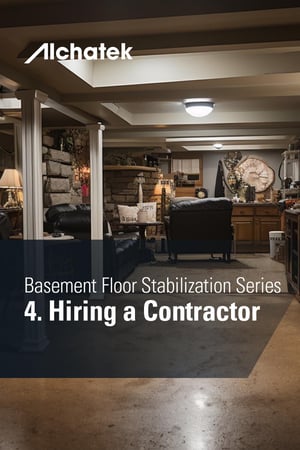 Your home's basement floor serves as an integral component of the structure, playing a pivotal role in maintaining the overall stability and integrity of the house. However, like all parts of a home, it's subject to wear and tear, and there are times when it might need professional attention. Recognizing these moments is crucial not just for the health of the structure but also for the safety of its inhabitants.
Your home's basement floor serves as an integral component of the structure, playing a pivotal role in maintaining the overall stability and integrity of the house. However, like all parts of a home, it's subject to wear and tear, and there are times when it might need professional attention. Recognizing these moments is crucial not just for the health of the structure but also for the safety of its inhabitants.

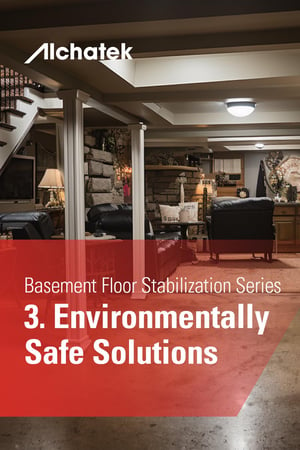 Ensuring the stability of your basement floor is an imperative task for every homeowner. Yet, in our pursuit of a sturdy home, it is crucial not to overlook the environmental ramifications of repair materials and methods. Balancing these dual responsibilities can be challenging, but with informed choices, homeowners can achieve both goals seamlessly.
Ensuring the stability of your basement floor is an imperative task for every homeowner. Yet, in our pursuit of a sturdy home, it is crucial not to overlook the environmental ramifications of repair materials and methods. Balancing these dual responsibilities can be challenging, but with informed choices, homeowners can achieve both goals seamlessly.
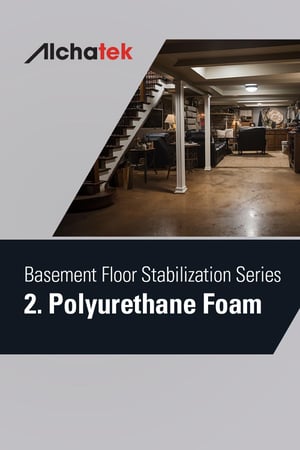 The basement, being one of the most vital components of a home, requires solutions that are both efficient and long-lasting when it comes to addressing unstable floor slab issues. Traditional methods of repair, although effective, can often be invasive, time-consuming, and expensive. Enter polyurethane foam—a revolutionary solution to basement floor slab stability issues.
The basement, being one of the most vital components of a home, requires solutions that are both efficient and long-lasting when it comes to addressing unstable floor slab issues. Traditional methods of repair, although effective, can often be invasive, time-consuming, and expensive. Enter polyurethane foam—a revolutionary solution to basement floor slab stability issues.
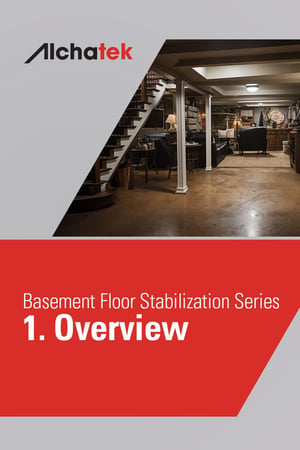 For many homeowners, a basement represents more than just a foundation—it's an extension of their living space, a storage haven, or even a cozy retreat. Ensuring the structural integrity and safety of your basement is paramount, not just for the sake of the basement itself but for the overall health and well-being of your home and its inhabitants. The basement floor is a critical component that plays a significant role in ensuring your basement is dry, stable, and safe.
For many homeowners, a basement represents more than just a foundation—it's an extension of their living space, a storage haven, or even a cozy retreat. Ensuring the structural integrity and safety of your basement is paramount, not just for the sake of the basement itself but for the overall health and well-being of your home and its inhabitants. The basement floor is a critical component that plays a significant role in ensuring your basement is dry, stable, and safe.